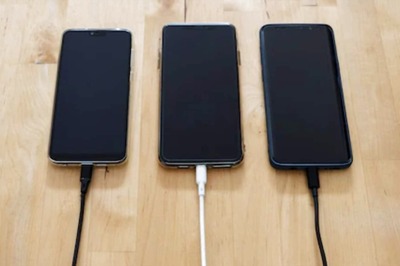
views
San Francisco: Facebook chief Mark Zuckerberg said Wednesday he remains the best person to lead the social network despite acknowledging mistakes in underestimating abuse of the platform.
Zuckerberg told reporters on a conference call that he accepted responsibility for the hijacking of private user data and other abuses, but when asked if he remained the best person to lead Facebook, he answered "Yes."
"I think life is about learning from the mistakes and figuring out how to move forward," he said.
"When you're building something like Facebook which is unprecedented in the world, there are things that you're going to mess up. What I think people should hold us accountable for is if we are learning from our mistakes."
Facebook is facing its worst privacy scandal in years following allegations that Cambridge Analytica, a Trump-affiliated data mining firm, used ill-gotten data from millions of users through an app to try to influence elections.
Facebook said Wednesday that as many as 87 million people might have had their data accessed — an increase from the 50 million disclosed in published reports. Facebook is basing the estimate in part on the number of friends each user might have had. Cambridge Analytica said in a statement that it had data for only 30 million people.
On Monday all Facebook users will receive a notice on their Facebook feeds with a link to see what apps they use and what information they have shared with those apps. They'll have a chance to delete apps they no longer want. Users who might have had their data shared with Cambridge Analytica will be told of that. Facebook says most of the affected users are in the U.S.
Zuckerberg said fixing the company's problems will take years.
Besides the privacy scandal, Facebook also has been dealing with fake news, the use of Facebook to spread hate and discord and concerns about social media's effect on people's mental well-being.
These are "big issues" and a big shift for Facebook as it broadens its responsibility, Zuckerberg said. He added that he does think that by the end of this year the company will have "turned a corner" on a lot of the issues. Zuckerberg has made fixing the company his personal challenge for 2018.
As part of the steps it's taking to address scrutiny about outsiders' access to user data, Facebook outlined several changes to further tighten its policies. For one, it is restricting access that apps can have to data about users' events, as well as information about groups such as member lists and content.
In addition, the company is also removing the option to search for users by entering a phone number or an email address. While this helped individuals find friends, Facebook says businesses that had phone or email information on customers were able to collect profile information this way. Facebook says it believes most of its 2.2 billion users had their public profile information scraped by businesses or various malicious actors through this technique at some point. Posts and other content set to be visible only to friends weren't collected.
This comes on top of changes announced a few weeks ago. For example, Facebook has said it will remove developers' access to people's data if the person has not used the app in three months.
Earlier Wednesday, Facebook unveiled a new privacy policy that seeks to clarify its data collection and use.
Although Facebook says the policy changes aren't prompted by recent events or tighter privacy rules coming from the EU, it's an opportune time. Zuckerberg is set to testify April 10 before a joint hearing of the Senate Commerce and Judiciary Committees, and a day later before the House Energy and Commerce Committee . The two sessions will be his first testimony before Congress. Separately, the U.S. Federal Trade Commission and various authorities in Europe are investigating.
As Facebook evolved from a closed, Harvard-only network with no ads to a giant corporation with $40 billion in advertising revenue and huge subsidiaries like Instagram and WhatsApp, its privacy policy has also shifted — over and over.
Almost always, critics say, the changes meant a move away from protecting user privacy toward pushing openness and more sharing. On the other hand, regulatory and user pressure has sometimes led Facebook to pull back on its data collection and use and to explain things in plainer language — in contrast to dense legalese from many other internet companies.
The policy changes come a week after Facebook gave its privacy settings a makeover. The company tried to make it easier to navigate its complex and often confusing privacy and security settings, though the makeover didn't change what Facebook collects and shares either.(With agency inputs)




















Comments
0 comment